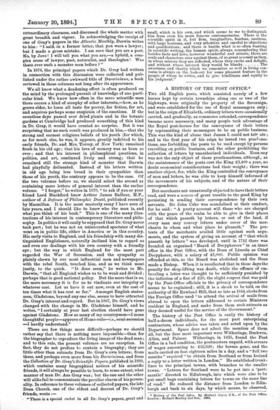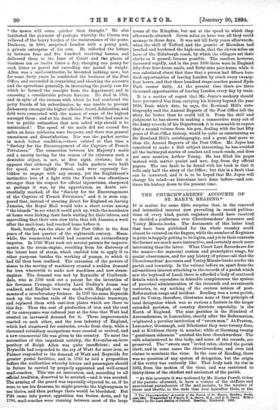A HISTORY OF THE POST OFFICE.*
THE old English posts, which consisted merely of a few horses kept by certain townships along one or two of the highways, were originally the property of the Sovereign, and were established for the use of Royal messengers only; but in the reign of Elizabeth, ordinary letters were occasionally carried, and gradually, as commerce extended, correspondence became more necessary, and many people took advantage of the Royal post-horses for the conveyance of their letters by representing their messengers to be on public business. This was the kind of abuse that James I. could not tole ate ; and in the first year of his reign he issued two procl 'ma- tions, one forbidding the posts to be used except by persons travelling on public business, and the other prohibiting the collection of letters by unauthorised individuals. Econ my was not the only object of these proclamations, althougL, as the maintenance of the posts cost the King 23,400 a year, no doubt economical considerations had their weight; there was another object, for, while the King controlled the conveyance of men and letters, he was able to keep himself informed of the movements of his subjects, and of the nature of their correspondence.
But merchants not unnaturally objected to have their letters read, and were a source of great trouble to the good King by persisting in sending their correspondence by their own servants. Sir John Coke was scandalised at their conduct, for he said "A pretty account will those who are charged with the peace of the realm be able to give in their places of that which passeth by letters, or out of the land, if every man may convey letters under cover of the mer- chants to whom and what place he pleaseth." The pro- tests of the merchants availed little against such argu- ments, and the system of giving an account of "that which passeth by letters" was developed, until in 1742 there was founded an organised "Board of Decypherers " in an inner office in the Post Office, with the Dean of Lincoln as Chief Decypherer, with a salary of £1,000. Public opinion was offended at this, so the Board was abolished and the Dean made a Bishop. When it is recollected that in those days the penalty for shop-lifting was death, while the offence of em- bezzling a letter was thought to be sufficiently punished by the infliction of a fine of £20, the slight respect that was paid by the Post-Office officials to the privacy of correspondence seems to be explained ; still, it is a shock to be told, on the authority of Sir Rowland Hill, that so late as 1844, clerks from the Foreign Office used "to attend the arrival of mails from abroad to open the letters addressed to certain Ministers resident in England, and make from them such extracts as they deemed useful for the service of the Government."
The history of the Post Office is really the history of half-a-dozen individuals, for the most part enterprising contractors, whose advice was taken and acted upon by the Department. Space does not admit the mention of them all, but the four most important were Witherings, Dockwra, Allen, and Palmer. Witherings, in 1635, found the Post Office in a bad condition, the postmasters unpaid, with arrears of wages amounting to £22,626; the horses gone, and the mails carried on foot eighteen miles in a day, and a "full two months" required "to obtain from Scotland or from Ireland
a reply to a letter written in London." He established trunk- lines to the principal towns, with branches to the smaller towns. "Letters for Scotland were to be put into a 'port- mantle ' directed to Edinburgh, into which were also to be put small bags containing letters for towns on the same line of road." He reduced the distance from London to Edin- burgh and back to six days, by which means, be observed,
• History of the Post Office. By Herbert Joyce, 0.B., of the Post Office. London : Richard Bentley and Son. 1893. "the newes -will come quicker than thought." He also instituted the payment of postage, whereby the Crown was relieved of the heavy burden of the maintenance of the posts. Dockwra, in 1680, surprised London with a penny post, a private enterprise of his own. He collected the letters in between four and five hundred receiving houses, and delivered them to the Inns of Court and the places of business ten or twelve times a day, charging one penny for each letter or parcel not exceeding one pound in weight. Allen was a mail-contractor, he invented nothing new ; but for some forty years he conducted the business of the Post Office, and succeeded in organising and checking the accounts and the operations generally, in increasing the yearly sum for which he farmed the receipts from the department, and in amassing a considerable private fortune. He died in 1764, and in spite of the success with which he had combated the petty frauds of his subordinates, he was unable to prevent dishonesty amongst the higher officials ; fraud, defalcation, and debt were connected with the names of some of the highest amongst them ; and at his death the Post Office had sunk so low in public estimation that men asked why should it be maintained I The speed of the mails did not exceed five miles an hour, robberies were frequent, and there was general uneasiness and dissatisfaction. Nor was the packet service in much better condition,—there existed at that time a "Society for the Encouragement of the Capture of French Privateers." The connection between his Majesty's mails and a society having for the reason of its existence such a desirable object, is not, at first sight, obvious ; but it appears that although the West India packets were built for speed, were lightly armed, and were expressly for- bidden to engage with any enemy, yet the Englishman's instinctive love of a fight with the French was oftentimes stronger than his respect for official injunctions, sharpened as perhaps it was, by the approbation, no doubt sub- stantially marked, of the "Society for the Encouragement of the Capture of French Privateers," and it is even sup- posed that, instead of steering direct for England on leaving Jamaica, the Royal Mail would take a short cruise among "the islands "to see what it could pick up, while the merchants at home were kicking their heels waiting for their letters, and marvelling that their own slow tubs, that left Jamaica a week after the mail-boat, had reached home before it.
Such, briefly, was the state of the Post Office in the first years of the last quarter of the eighteenth century. Mean- while, the commercial world had received an extraordinary impetus. In 1769 Watt took out several patents for improve- ments in the steam-engine, resulting from his discovery of the latent heat of steam, which enabled him to apply it to other purposes besides the working of pumps, to which it had till then been confined. The extension of the powers of steam to the moving of machinery created a sudden demand for iron wherewith to make new machines and new steam- engines. The demand was met by Reynolds of Coalbrook- dale, who in 1766 took out a patent for the invention of his foreman Cranage, whereby Lord Dudley's dream was realised, and English iron was made with English coal by means of a reverberatory furnace. In 1767 the same Reynolds took up the wooden rails of the Coalbrookdale tramways, and replaced them with cast-iron plates which are there to this day. Thus the cost of production of iron and the cost of its conveyance was reduced just at the time that Watt had created an increased demand for it. These improvements reacted on each other, and the iron industry of England, which had slumbered for centuries, awoke from sleep, while a thousand subsidiary occupations were created or revived, and a new commercial life was given to the country. To meet the necessities of this impatient activity, the five-miles-an-hour postboy of Ralph Allen was quite insufficient ; and as Reynolds had responded to the cry of Watt for more iron, so Palmer responded to the demand of Watt and Reynolds for greater postal facilities, and in 1782 he laid a proposition before the authorities whereby letters and passengers should in future be carried by properly appointed and well-armed mail-coaches. This was an innovation, and, according to all official tradition, deserved to be scouted,—and it was scouted. The arming of the guard was especially objected to, as, if he were to use his firearms, he might provoke the highwaymen to use theirs, and then perhaps there would be bloodshed. But Pitt came into power, opposition was beaten down, and by 1786, mail-coaches were running between most of the large
towns of the Kingdom, but not at the speed' to which they afterwards attained. Seven miles an hour was all they could manage in those days. It was not till forty years afterwards, when the skill of Telford and the granite of Macadam had levelled and hardened the high-roads, that the eleven miles an hour of the Edinburgh coach, by which the villagers set-their clocks as it passed, became possible. The coaches, however, increased rapidly, and in the year 1836 there were in England fifty-four four-horse mails, and forty-nine pair-horse, while it was calculated about that time that a person had fifteen hun- dred opportunities of leaving London by coach every twenty- four hours, and that three hundred stage-coaches passed Hyde Park corner daily. At the present time there are three thousand opportunities of leaving London every day by train.
It is a matter of regret that Mr. Joyce's modesty should have prevented him from carrying his history beyond the year 1836, from which date, he sari, Sir Rowland Hill's auto- -biography and the Annual Reports of the Post Office tell the story far better than he could tell it. From the skill and judgment he has shown in making a consecutive story out of the dusty records of his Department, it is reasonable to expect that a second volume from his pen, dealing with the last fifty years of Post-Office history, would be quite as entertaining as Sir Rowland Hill's autobiography, and a great deal more so than the Annual Reports of the Post Office. Mr. Joyce has contrived to make a dull subject interesting, he has avoided all the hackneyed stories of coaches and coach-roads, and does not once mention Arthur Young. He has filled his pages instead with matter quaint and new, dug from dry official papers. The one fault to be found with his book is that it tells only half the story of the Office; but this is a fault that can be corrected, and it is to be hoped that Mr. Joyce will change his mind—as historians have done before—and con- tinue his history down to the present time.



































 Previous page
Previous page